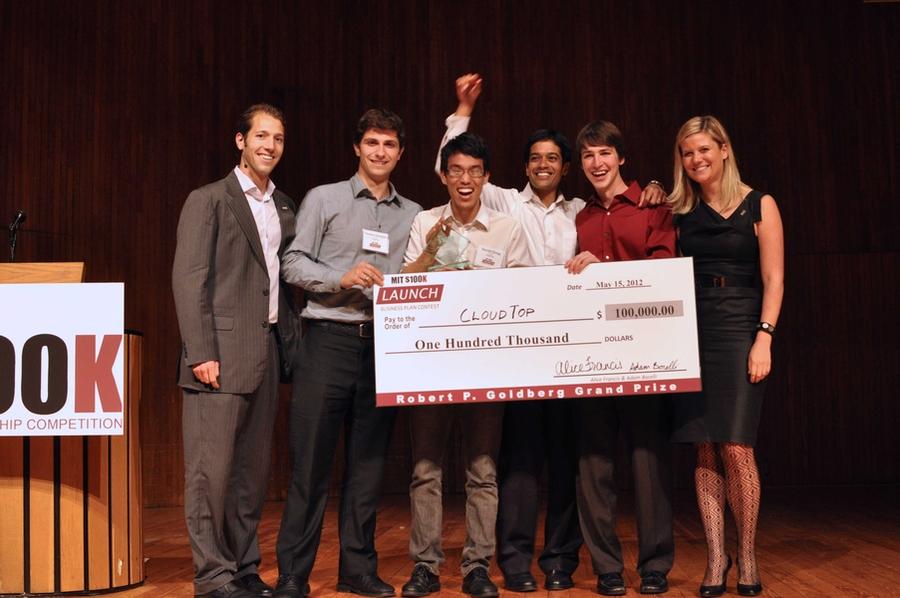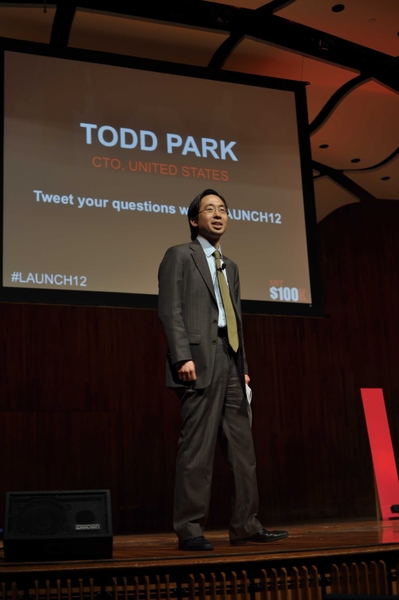This year’s MIT $100K Business Plan Contest drew a record 215 teams to compete for the coveted grand prize: $100,000 to start a business venture or market a new product. On Tuesday evening, eight finalists pitched their ideas to a capacity crowd in Kresge Auditorium — and while only one team walked away with the big check, there was plenty of seed money and startup opportunity to go around.
The winning team beat out the competition with its pitch for CloudTop, a Web-based application that would enable the user to connect disparate computer programs in a single online application. The team says the app may provide an entirely new computing paradigm: Instead of having to carry around a laptop with all your saved files, you may be able to access those files from any computer with an Internet connection. With the app, a user may take photos from Facebook, edit them in Pixlr, and save them into a Microsoft Word document — all within the same secure Web browser.
On Tuesday, the CloudTop team of four MIT students appealed to the audience and judges with a final pitch line: “We envision a world where your digital life goes wherever you go … it’s totally freeing.” The $100,000 prize now frees the CloudTop team to pursue commercialization opportunities.
But the remaining finalists didn’t go home empty-handed. In addition to making one last business pitch, each finalist received $15,000 for rising to the top of their respective track: life sciences; products and services; mobile; web/IT; energy; and the Segal Family Foundation’s emerging markets track. Two more finalists were selected as wild cards for Tuesday’s finale.
The contest also sponsored several offshoots: a $10,000 Data Prize, sponsored by Thomson Reuters, for the team with the most innovative data-centric business plan; a $5,000 YouTube Pitch Prize, awarded to the team with the best 60-second video pitch for a business idea; and a $2,000 Audience Choice Award, for the team with the best pitch of the night, as voted by audience members via text messages.
An entrepreneur’s playbook
The event’s keynote speaker, Todd Park, appointed by President Barack Obama earlier this year as chief technology officer for the United States, commented enthusiastically on MIT’s entrepreneurial spirit, noting that contests such as the $100K help to “unleash entrepreneurship” and push technology solutions into the marketplace.
Often pacing onstage and drawing appreciative laughs from the crowd, Park talked about his previous experience as chief technology officer — or “entrepreneur in residence,” as he called it — for the U.S. Department of Health and Human Services. There, he was tasked with making public the agency’s vast archive of medical data. He decided to “take a page from the MIT playbook” and hold a competition — which he fondly dubbed “Datapalooza” — to identify innovative ways to use health data to help consumers.
Park now hopes to hold similar entrepreneurial contests to solve some of the country’s biggest issues in energy, public safety and finance. “There’s no problem that we can’t invent ourselves out of,” he said. “Don’t stop being addicted to building something out of nothing. That’s what makes an entrepreneur.”
Everyone’s a winner
The $100K competition's runner-up, LiquiGlide, pitched a product that would solve a particularly sticky problem: The team invented a slippery, biocompatible coating that could be used to line ketchup and mustard bottles. A video illustrating the product showed a blob of ketchup sliding through a glass bottle with a simple tilt of the hand — a frictionless alternative to today’s less user-friendly condiment designs. The group’s quirky pitch earned it the Audience Choice Award, along with $2,000.
Two teams pitched health-related business plans: IoVista, a finalist in the emerging markets track, presented a plan for a handheld device that quickly performs eye tests. The team said the device could be useful in areas such as rural India and China that have few trained eye specialists.
Podimetrics, a finalist in the life sciences track, made its case for what looked like a bath mat — but when a team member stood on the mat, a screen overhead projected an image of his feet. The team designed the mat’s sensors to quickly detect abnormalities that are common complications for patients with diabetes.
In the products and services track, Cryoocyte pitched a new method to freeze fish eggs — a tricky operation that the team said may help rejuvenate fisheries if stocks collapse. The team hopes to both make a profit and replenish fish stocks, a solution team members envisioned as “enabling the blue revolution.”
Several teams presented solutions to energy and web-based problems. SolidEnergy, a finalist in the energy track, pitched a new battery design that would stretch a laptop’s battery life on a single charge to 16 hours. Team member Qichao Hu, whose PhD thesis spawned the design, listed the many MIT collaborations that helped to improve the design. “The story of SolidEnergy is only possible at MIT,” Hu said.
The team MegaMIMO sought to unjam wireless connections. The team pointed out that in one of the late Steve Jobs’ presentations, the Apple co-founder had asked the audience to power down all laptops and smartphones, so Jobs himself could connect to a wireless network. “This might work for Steve Jobs, but not for the rest of us,” a team member said.
MegaMIMO’s solution is an “access point design” for overcrowded networks that clears up interfering signals, allowing more users to wirelessly connect without losing data transmission speed. The team capped their presentation with the tagline: “Mo’ MIMO, no problems.”
A potential alternative to Craigslist came in the form of Peddl, a team that pitched an app for buying and selling goods and services online. Like Craigslist, the application emphasizes local goods, but with an added bonus: The app creates maps, flagging listings close to a user’s location or address. The user-friendly interface allows a customer to indicate interest in a listing, contact a buyer, ask for a lower price, or post a listing. “For the last decade, Craigslist has dominated the local market,” the team pitched. “We think this area is ripe for disruption.”
The winning team beat out the competition with its pitch for CloudTop, a Web-based application that would enable the user to connect disparate computer programs in a single online application. The team says the app may provide an entirely new computing paradigm: Instead of having to carry around a laptop with all your saved files, you may be able to access those files from any computer with an Internet connection. With the app, a user may take photos from Facebook, edit them in Pixlr, and save them into a Microsoft Word document — all within the same secure Web browser.
On Tuesday, the CloudTop team of four MIT students appealed to the audience and judges with a final pitch line: “We envision a world where your digital life goes wherever you go … it’s totally freeing.” The $100,000 prize now frees the CloudTop team to pursue commercialization opportunities.
But the remaining finalists didn’t go home empty-handed. In addition to making one last business pitch, each finalist received $15,000 for rising to the top of their respective track: life sciences; products and services; mobile; web/IT; energy; and the Segal Family Foundation’s emerging markets track. Two more finalists were selected as wild cards for Tuesday’s finale.
The contest also sponsored several offshoots: a $10,000 Data Prize, sponsored by Thomson Reuters, for the team with the most innovative data-centric business plan; a $5,000 YouTube Pitch Prize, awarded to the team with the best 60-second video pitch for a business idea; and a $2,000 Audience Choice Award, for the team with the best pitch of the night, as voted by audience members via text messages.
An entrepreneur’s playbook
The event’s keynote speaker, Todd Park, appointed by President Barack Obama earlier this year as chief technology officer for the United States, commented enthusiastically on MIT’s entrepreneurial spirit, noting that contests such as the $100K help to “unleash entrepreneurship” and push technology solutions into the marketplace.
Often pacing onstage and drawing appreciative laughs from the crowd, Park talked about his previous experience as chief technology officer — or “entrepreneur in residence,” as he called it — for the U.S. Department of Health and Human Services. There, he was tasked with making public the agency’s vast archive of medical data. He decided to “take a page from the MIT playbook” and hold a competition — which he fondly dubbed “Datapalooza” — to identify innovative ways to use health data to help consumers.
Park now hopes to hold similar entrepreneurial contests to solve some of the country’s biggest issues in energy, public safety and finance. “There’s no problem that we can’t invent ourselves out of,” he said. “Don’t stop being addicted to building something out of nothing. That’s what makes an entrepreneur.”
Everyone’s a winner
The $100K competition's runner-up, LiquiGlide, pitched a product that would solve a particularly sticky problem: The team invented a slippery, biocompatible coating that could be used to line ketchup and mustard bottles. A video illustrating the product showed a blob of ketchup sliding through a glass bottle with a simple tilt of the hand — a frictionless alternative to today’s less user-friendly condiment designs. The group’s quirky pitch earned it the Audience Choice Award, along with $2,000.
Two teams pitched health-related business plans: IoVista, a finalist in the emerging markets track, presented a plan for a handheld device that quickly performs eye tests. The team said the device could be useful in areas such as rural India and China that have few trained eye specialists.
Podimetrics, a finalist in the life sciences track, made its case for what looked like a bath mat — but when a team member stood on the mat, a screen overhead projected an image of his feet. The team designed the mat’s sensors to quickly detect abnormalities that are common complications for patients with diabetes.
In the products and services track, Cryoocyte pitched a new method to freeze fish eggs — a tricky operation that the team said may help rejuvenate fisheries if stocks collapse. The team hopes to both make a profit and replenish fish stocks, a solution team members envisioned as “enabling the blue revolution.”
Several teams presented solutions to energy and web-based problems. SolidEnergy, a finalist in the energy track, pitched a new battery design that would stretch a laptop’s battery life on a single charge to 16 hours. Team member Qichao Hu, whose PhD thesis spawned the design, listed the many MIT collaborations that helped to improve the design. “The story of SolidEnergy is only possible at MIT,” Hu said.
The team MegaMIMO sought to unjam wireless connections. The team pointed out that in one of the late Steve Jobs’ presentations, the Apple co-founder had asked the audience to power down all laptops and smartphones, so Jobs himself could connect to a wireless network. “This might work for Steve Jobs, but not for the rest of us,” a team member said.
MegaMIMO’s solution is an “access point design” for overcrowded networks that clears up interfering signals, allowing more users to wirelessly connect without losing data transmission speed. The team capped their presentation with the tagline: “Mo’ MIMO, no problems.”
A potential alternative to Craigslist came in the form of Peddl, a team that pitched an app for buying and selling goods and services online. Like Craigslist, the application emphasizes local goods, but with an added bonus: The app creates maps, flagging listings close to a user’s location or address. The user-friendly interface allows a customer to indicate interest in a listing, contact a buyer, ask for a lower price, or post a listing. “For the last decade, Craigslist has dominated the local market,” the team pitched. “We think this area is ripe for disruption.”







